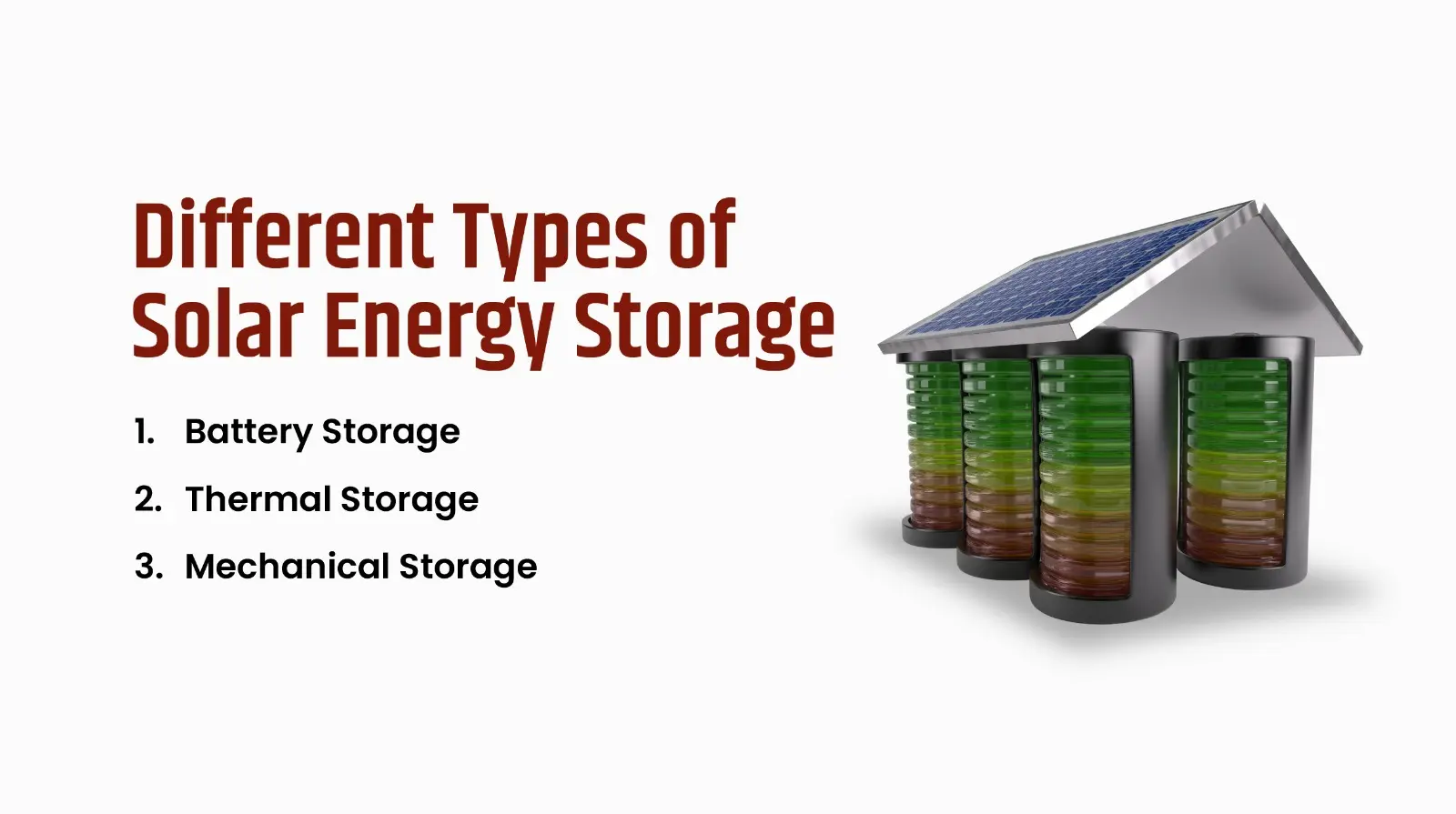Solar Energy Storage: The Ultimate Guide
The world is facing an energy crisis, leading everybody to renewable energy sources. One such wonderful source is solar energy which offers a very energy-efficient and sustainable solution. You already know the mechanism behind the proper use of solar energy. Solar panels harness the sun’s energy and convert it into heat or electricity. Now the thing is, photovoltaic panels only create power when the sun is shining so that's where solar energy storage comes into the picture. These systems store the energy for later use.
Now the question is how does solar energy storage work? Let's find out!
What is Solar Energy Storage?
During the nighttime the power demand is high, but as the sun is not shining, the solar panels don't work. That's where solar energy storage helps power buildings or homes. It is the process of storing excess electricity in different types of solar batteries. Solar energy storage doesn't just mean battery storage, there's more to it. Let's read on.
How is Solar Energy Stored?

There are three ways to store solar energy - Battery, Thermal, and Mechanical. These systems work differently to store energy, let's read to know how.
Battery Storage
This system is the most common type used to store solar power. You’ll find batteries mainly connected to off-grid solar power systems. The process of energy storage involves the batteries converting electricity into chemical energy. The chemical energy is then converted back into electricity when required. The different types of solar batteries are:
- Lithium-ion Batteries: These batteries are a common option for home applications. And are remarkable because of their high energy density, small size, and longevity. Besides all of that, you will find that they function well despite their price.
- Lead-acid Batteries: While they are slightly older than lithium-ion batteries, lead-acid batteries remain appreciated for their low cost. The downside is that they can weigh a lot and have low energy density.
- Flow Batteries: These batteries are a result of innovation, they use liquid electrolytes to store energy. Flow battery storage can be a little expensive due to their innovative technology.
2. Thermal Storage
In thermal energy storage (TES) systems, solar energy gets stored in the form of heat. Solar panels capture the sunlight and convert it into heat. The same heat is stored in various mediums such as water or molten salts. These mediums absorb and retain heat for a long, long time. Also, an insulated tank is used to store the heated mediums and are kept there until it's time to use the energy. The most common form of thermal storage is molten salt storage.
3. Mechanical Storage
Mechanical storage systems store solar energy in the form of kinetic or potential energy. This is later converted back to electrical energy. There are two main types of mechanical storage. One is pumped hydro system storage, the most widely used type of energy storage. This system pumps water from a lower reservoir to an upper reservoir using solar energy to store potential energy. The water is released to flow back through turbines to electricity when needed.
Second is flywheel storage, a technology that uses a rotating mechanism to maintain rotational energy. The flywheel is accelerated by large amounts of solar energy and when the power is demanded, the flywheel slows down and transforms the kinetic energy back into electrical energy.
What are the Benefits of Solar Energy Storage?
There are so many reasons as to why storing solar energy is useful. Below are listed a few.
- Balanced Energy Loads - Do you know what will happen without storage? The excess energy produced by the panels will go to waste. By installing battery storage, you’ll be helping balance energy loads. These storage systems can store energy during low demands and use it during high demands.
- Emergency Backup - What would you do during a sudden power cut or bad weather? In such times the electricity grid can fail, so that's where the solar energy storage comes into use. The storage systems have backup power to ensure that you won't be left in the dark.
- Lowered Electricity Bills - Choosing an efficient solar storage system will store extra energy for you and you won't have to worry about using the electricity grid. You’ll reduce your bills in this way by relying on the storage when necessary.
- Reduced Carbon Footprints - The conventional sources of energy are responsible for all the pollution and harm to the environment. You're not only doing good for yourself but also the environment by going solar. A solar system with energy storage will help you use clean power thus reducing carbon emissions.
- Energy Independence - There are so many places where frequent power outages occur, and where the electricity grid is not an economical option. Such places benefit greatly from solar systems with solar energy storage. The stored green energy helps power homes and appliances in remote areas.
Factors to Consider When Choosing Solar Energy Storage
-
Storage Capacity - You have to consider your energy needs when picking a solar energy storage system. If your home or business demands high power, then go for systems with large storage capacity. This will help you power your home or office smoothly.
- Battery Life - Solar batteries tend to last 10 to 15 years with proper maintenance. Who doesn't want a durable battery? Selecting high-efficiency solar batteries with a strong warranty is necessary for the best performance.
- System Integration - You should think about system integration if you intend to add to your current solar system with solar energy storage. For increased efficiency, make sure your battery system and inverter are compatible.
Conclusion
We all can agree that solar panels have been helping us for as long as we can remember. They work to provide a green and sustainable source of energy. However, without solar storage, their efficiency can be reduced, solar energy storage is the support system. So, when looking for solar panels for homes or businesses, do consider solar energy storage too!
KLK Ventures wants the future to be a safe and bright place and that's why we are consistently working towards that goal. You can join us on this sustainable venture and get the best solar solutions from us. Help yourself and the environment with energy-efficient options!
FAQs
1. Which battery is most suitable for solar energy storage?
Lithium-ion batteries have been a popular choice among people. These batteries are highly efficient and offer a good value too.
2. Can a solar battery last all night?
Whether a solar battery can last all night or not depends on many other aspects. These include the battery capacity, the sunlight absorption, and the energy requirements. Mostly, they can power your home overnight in case of power outages.
3. What is the lifespan of a solar battery?
With proper care, solar batteries can last between 10 and 15 years. For longevity, pick high-quality batteries.
4. How can I save money with solar energy storage?
You can store energy for later use with the support of these systems. As a result, you won't need to depend as heavily on the electrical grid. Your electricity bills will automatically go down as a result, saving you a lot of money.
